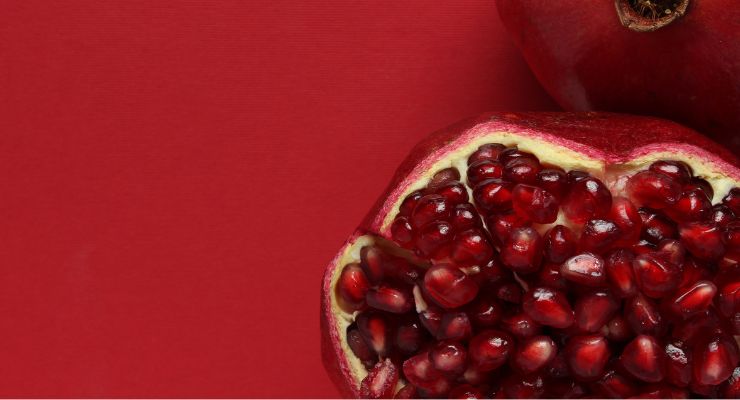12.08.22
A new clinical study investigating a pomegranate extract marketed by Verdure Sciences as Pomella found that supplementation had a synergistic benefit to gut and skin microbiomes in human participants.
Healthy men and women between the ages of 22 and 55 were administered either a placebo or 250 mg of the ingredient daily for four weeks. Compared to placebo, those who took the supplement saw a significant reduction in wrinkle severity (6.2%), and a decreasing trend in forehead sebum excretion rate.
Pomella supplementation was linked to significant augmentations for the Bacillus genus and Staphylococcus epidermis after the treatment, a 38% increase in short-chain fatty acid (SCFA) production (vs. a 1.8% increase in placebo) and a 162% increase in propionates (vs. 0.1% increase with placebo).
Overall, the study demonstrated improvements in several physical properties, wrinkles, and shifts in the skin microbiota with Pomella supplementation in healthy subjects, the researchers concluded.
Further, higher levels of Eggerthellaceae in the gut microbiome were correlated with a decrease in both transepidermal water loss (TEWL) and wrinkle severity in the Pomella group, suggesting that the extract improved skin barrier function in addition to improving the appearance of wrinkles.
“A sub-analysis among participants in the Pomella group for the gut microbiome expression Eggerthellaceae was performed. A relative decrease in sebum was seen in those that had a higher expression of Eggerthellaceae, although not statistically significant (p+0.33). Not only is this impressive, but is shows a strong correlation for Pomella’s influence to the gut-skin axis,” the researchers wrote. “It is interesting that we were able to stratify responses based on the gut expression of Eggerthellaceae. Bacterial species belonging to Eggerthellaceae are able to produce urolithin metabolites from ellagitannins, which are found in pomegranates and in [Pomella]. Therefore, our results suggest that the presence of Eggerthellaceae may predict a better response to Pomella supplementation and support the notion of a gut-skin axis when considering oral supplementation.”
“We are thrilled to have this new publication join the mounting evidence in support of Pomella extract, at a 250 mg dose, once a day,’ said Kristin Marshall, digital marketing manager with Verdure Sciences. “Gut and digestive health, skin support, and beauty from within have gained a lot of mainstream attention in recent years. What happens in the gut is reflected on the skin, and now we have clinical support showing the same.”
Healthy men and women between the ages of 22 and 55 were administered either a placebo or 250 mg of the ingredient daily for four weeks. Compared to placebo, those who took the supplement saw a significant reduction in wrinkle severity (6.2%), and a decreasing trend in forehead sebum excretion rate.
Pomella supplementation was linked to significant augmentations for the Bacillus genus and Staphylococcus epidermis after the treatment, a 38% increase in short-chain fatty acid (SCFA) production (vs. a 1.8% increase in placebo) and a 162% increase in propionates (vs. 0.1% increase with placebo).
Overall, the study demonstrated improvements in several physical properties, wrinkles, and shifts in the skin microbiota with Pomella supplementation in healthy subjects, the researchers concluded.
Further, higher levels of Eggerthellaceae in the gut microbiome were correlated with a decrease in both transepidermal water loss (TEWL) and wrinkle severity in the Pomella group, suggesting that the extract improved skin barrier function in addition to improving the appearance of wrinkles.
“A sub-analysis among participants in the Pomella group for the gut microbiome expression Eggerthellaceae was performed. A relative decrease in sebum was seen in those that had a higher expression of Eggerthellaceae, although not statistically significant (p+0.33). Not only is this impressive, but is shows a strong correlation for Pomella’s influence to the gut-skin axis,” the researchers wrote. “It is interesting that we were able to stratify responses based on the gut expression of Eggerthellaceae. Bacterial species belonging to Eggerthellaceae are able to produce urolithin metabolites from ellagitannins, which are found in pomegranates and in [Pomella]. Therefore, our results suggest that the presence of Eggerthellaceae may predict a better response to Pomella supplementation and support the notion of a gut-skin axis when considering oral supplementation.”
“We are thrilled to have this new publication join the mounting evidence in support of Pomella extract, at a 250 mg dose, once a day,’ said Kristin Marshall, digital marketing manager with Verdure Sciences. “Gut and digestive health, skin support, and beauty from within have gained a lot of mainstream attention in recent years. What happens in the gut is reflected on the skin, and now we have clinical support showing the same.”




























